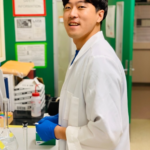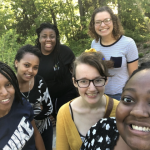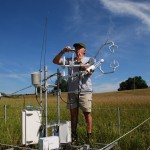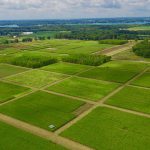Jinho Lee is a PhD student in the Plant, Soil and Microbial Sciences Department at Michigan State University. He works in the Kravchenko lab with interests in carbon dynamics of soil. Today we are facing one of the biggest environmental challenges that our species has never faced, and one that is caused by our own actions. Since the Industrial Revolution, the worldwide carbon dioxide (CO2) emissions have increased due to use of C-based fossil fuels. This has resulted in global warming. To alleviate global warming and reduce the dependence on fossil fuels, several alternative
Learning to step out of my comfort zone at KBS
Kellogg Biological Station (KBS) 2018 undergraduate summer researcher, Selassie Lijelu, is a Forensic Chemistry major at the University of Saint Francis-Fort Wayne. She wrote about herKBS Research Experiences for Undergraduates (REU) project working with the Haddad Lab. The summer of 2018, I was selected to participate in the Michigan State University Kellogg Biological Station (KBS)Research Experience for Undergraduates (REU) program. When I accepted the offer, I was extremely nervous and had no idea what the next eleven weeks in Hickory Corners, Michigan would consist of. I was
Generosity of local farmer creates national impact
Harold and Edythe Marshall’s gift of their 300-acre farm to Michigan State University has been a major boon to understanding the ecology of new biofuel crops, producing research results with national impact by scientists at MSU's Kellogg Biological Station (KBS). Under a unique partnership between the Marshalls and MSU, the farmland east of Hickory Corners in Barry County is enabling scientists from the KBS Long-term Ecological Research (LTER) program and the Great Lakes Bioenergy Research Center (GLBRC) to conduct unique biofuel research with funding from the US Department of Energy
Paradigm shifts: Re-envisioning agricultural landscapes to optimize ecosystem services
In 2013, the United Nations released a report projecting that the global population will reach 9.6 billion by the year 2050. This increase of 2.4 billion people between now and then is already beginning to challenge the world’s agricultural communities to provide adequate food, fuel and fiber while employing sustainable practices that conserve natural resources. The feat becomes more complex when coupled with the increasing demand to grow more bioenergy crops, combat biodiversity declines and regenerate the habitat of agriculturally important insects. Doug Landis, Michigan State University
CO2 flux towers help assess the sustainability of biofuels
This news piece by KBS LTER volunteer and retired journalist Bill Krasean. If the United States is to develop sustainable biofuels such as cellulosic ethanol as alternatives to grain-based ethanol and the burning of climate-changing fossil fuels, there are still many questions yet to be answered. Key among those questions is where best to grow biofuel crops without sacrificing valuable farm and forestland, says Jiquan Chen, Distinguished University Professor in Environmental Science at the University of Toledo and investigator in the U.S. Dept. of Energy’s (DOE) Great Lakes Bioenergy
Undergraduates conduct biofuel sustainability research at KBS
Cait Gallagher and Tamira Vojnar had the unique experience of gaining hands-on research experience as undergraduates at the KBS LTER this summer. Gallagher and Vojnar were part of the Research Experience for Undergraduates (REU) program that brings undergraduate students from across the country to KBS every summer. The ten-week REU program was funded by the Department of Energy through the Great Lakes Bioenergy Research Center (GLBRC). Gallagher, a senior at the University of Illinois at Urbana-Champaign, and Vojnar, a junior at Bowdoin College in Maine, were at KBS from May through early





